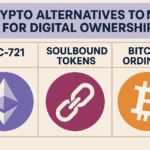In this article, I will outline Proof-of-Stake crypto alternatives to energy-intensive mining and show how modern blockchain networks have started shifting away from power-hungry Proof-of-Work systems.
These alternatives use staking instead of mining to reduce environmental impact while maintaining network security and scalability.
We’ll also look at key PoS platforms offering efficient, sustainable, and accessible solutions for decentralized technologies in the future.
Key Point & Proof-of-Stake Crypto Alternatives to Energy-Intensive Mining List
| Cryptocurrency | Key Point |
|---|---|
| Ethereum (ETH) | Pioneer of smart contracts and decentralized applications (dApps), Ethereum is the leading Layer-1 blockchain supporting DeFi, NFTs, and Web3 with a strong developer community and ongoing scalability upgrades (Ethereum 2.0). |
| Cardano (ADA) | Cardano is a peer-reviewed, proof-of-stake blockchain focused on academic research, security, and scalability, designed for sustainable and decentralized application development. |
| Solana (SOL) | Solana offers ultra-fast transaction speeds and low fees using a unique Proof of History (PoH) mechanism, making it a go-to platform for high-performance dApps and DeFi projects. |
| Polkadot (DOT) | Polkadot enables interoperability between different blockchains through its relay chain and parachains, allowing diverse ecosystems to communicate and scale efficiently. |
| Avalanche (AVAX) | Avalanche delivers near-instant finality and high throughput via its unique consensus protocol, supporting multiple custom blockchains and decentralized finance applications. |
| Algorand (ALGO) | Algorand is a scalable, eco-friendly blockchain using Pure Proof of Stake (PPoS), optimized for speed, minimal fees, and enterprise-grade applications. |
| Tezos (XTZ) | Tezos is a self-upgradable blockchain with on-chain governance, designed for long-term sustainability, smart contracts, and formal verification in decentralized applications. |
1.Ethereum (ETH)
Ethereum (ETH) successfully made the transition from Proof-of-Miner (PoM) to Proof-of-Stake through “The Merge”, replacing energy-intensive mining with validator staking and significantly reducing energy use by over 99%, marking one of the greatest sustainability milestones ever in blockchain history.

Validators were randomly chosen and now propose and attest blocks based on how much ETH they stake – replacing power hungry hardware altogether with decentralized validators who propose and attest blocks on an individual basis, making Ethereum a world leader when it comes to eco-conscious blockchain development while still upholding decentralization and security.
| Feature | Details |
|---|---|
| Consensus Mechanism | Proof-of-Stake (PoS) |
| Energy Efficiency | Over 99% reduction in energy use after transition from Proof-of-Work |
| Staking Requirement | 32 ETH to run a validator; lower via staking pools |
| KYC Requirement | Minimal or none when using decentralized staking platforms (e.g., Lido) |
| Decentralization | Large number of validators ensures network security and fairness |
| Smart Contract Support | Yes – Ethereum hosts the largest ecosystem of decentralized applications |
| Upgrade | “The Merge” (2022) – shifted Ethereum from mining to staking |
| Use Case Strength | DeFi, NFTs, DAOs, and Web3 infrastructure |
2.Cardano (ADA)
Ouroboros, a unique Proof-of-Stake protocol used by Cardano (ADA), was developed through peer-reviewed academic research to maximize network security and energy efficiency. Cardano chooses block validators based on staked ADA rather than electricity-intensive mining, which drastically lowers resource usage.

Its tiered architecture improves scalability without raising energy requirements by separating transaction settlement from smart contract execution. Cardano is a cutting-edge green blockchain with a scientifically based design that provides a safe and sustainable substitute for conventional Proof-of-Work systems.
| Feature | Details |
|---|---|
| Consensus Mechanism | Ouroboros Proof-of-Stake (PoS) |
| Energy Efficiency | Extremely low energy consumption; no mining required |
| Staking Requirement | No minimum to delegate; 10,000 ADA recommended to run a stake pool |
| KYC Requirement | Minimal or none when staking through non-custodial wallets (e.g., Yoroi) |
| Decentralization | Thousands of independent stake pools promote strong decentralization |
| Smart Contract Support | Yes – via Plutus platform |
| Upgrade Focus | Peer-reviewed updates with formal verification |
| Use Case Strength | Scalable dApps, identity, and governance solutions |
3.Solana (SOL)
Solana (SOL) provides fast, low-energy blockchain performance by combining Proof-of-Stake with its own Proof-of-History technology. Compared to traditional mining, Solana significantly lowers energy consumption and decreases validator coordination by pre-ordering events using cryptographic timestamps.
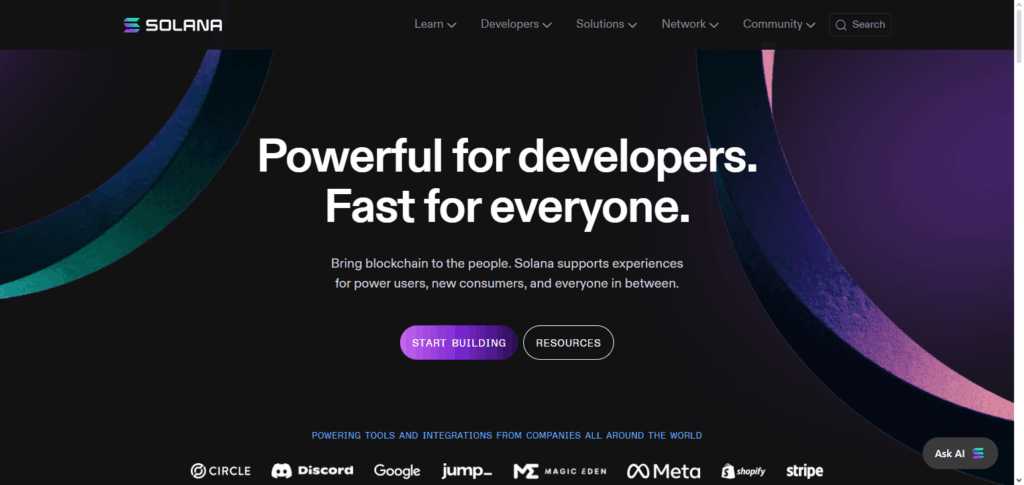
Thousands of transactions per second are made possible by this architecture without the need for resource-intensive calculations. Solana’s hybrid strategy positions it as a state-of-the-art Proof-of-Stake substitute for the energy-intensive systems of legacy blockchains while preserving decentralization and performance.
| Feature | Details |
|---|---|
| Consensus Mechanism | Hybrid: Proof-of-Stake (PoS) + Proof-of-History (PoH) |
| Energy Efficiency | Low energy usage; optimized for high throughput without mining |
| Staking Requirement | No minimum for delegation; ~5,000 SOL recommended to run a validator |
| KYC Requirement | Minimal or none when staking through non-custodial wallets (e.g., Phantom) |
| Decentralization | Hundreds of validators; fast-growing network |
| Smart Contract Support | Yes – optimized for high-performance dApps and DeFi |
| Transaction Speed | ~65,000 transactions per second (TPS) |
| Use Case Strength | Scalable apps, DeFi, gaming, NFTs |
4.Polkadot (DOT)
Polkadot (DOT) operates on a Nominated Proof-of-Stake (NPoS) system, where both validators and nominators secure its network without using energy-consuming mining equipment to do so. This approach replaces competitive computation with collaborative staking to significantly lower energy use.

What makes Polkadot unique is its ability to connect multiple parachains under one secure framework with seamless interoperability for maximum scalability and eco-friendliness compared with conventional Proof-of Work consensus models.
| Feature | Details |
|---|---|
| Consensus Mechanism | Nominated Proof-of-Stake (NPoS) |
| Energy Efficiency | Low energy usage; no mining involved |
| Staking Requirement | No minimum to nominate; ~200 DOT+ may be needed for rewards (varies) |
| KYC Requirement | Minimal or none via non-custodial wallets (e.g., Polkadot.js, Fearless) |
| Decentralization | Validator and nominator system ensures wide participation |
| Smart Contract Support | Enabled on parachains like Moonbeam and Astar |
| Interoperability | Built-in via relay chain and parachain structure |
| Use Case Strength | Cross-chain apps, custom blockchain networks, DeFi |
5.Avalanche (AVAX)
Avalanche (AVAX) employs a new Proof-of-Stake consensus called the Avalanche protocol, which leverages lightweight communication between validators and repeated random sampling to reach consensus quickly and with little energy consumption.
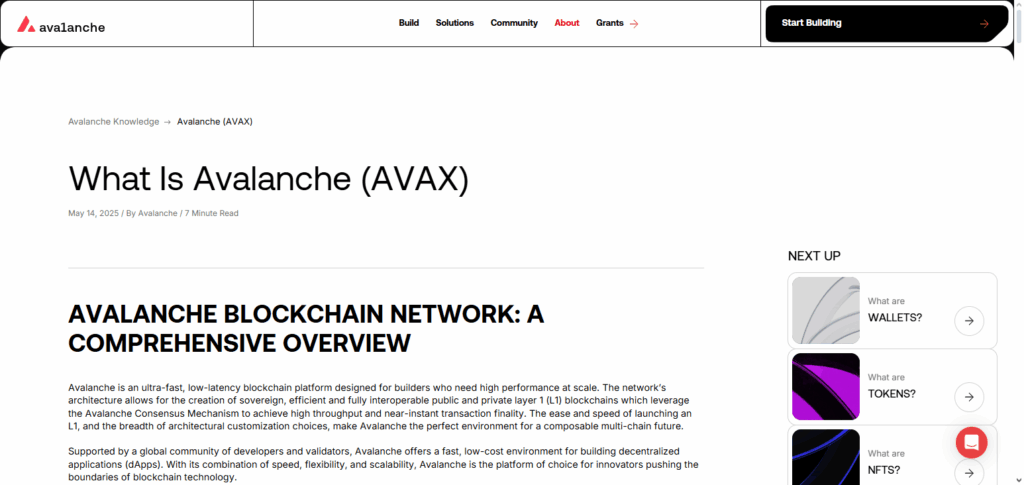
Validators take part by staking AVAX, which makes the system safe and environmentally friendly in contrast to traditional mining. Custom blockchains can run concurrently thanks to its special subnetwork architecture, which improves scalability without raising energy requirements. Because of this, Avalanche offers a cutting-edge, low-energy substitute for blockchain networks that rely heavily on mining while maintaining excellent performance.
| Feature | Details |
|---|---|
| Consensus Mechanism | Avalanche Consensus (a form of PoS) |
| Energy Efficiency | Very low energy consumption; no mining involved |
| Staking Requirement | Minimum 25 AVAX to delegate; 2,000 AVAX to run a validator |
| KYC Requirement | Minimal or none when staking via non-custodial wallets (e.g., Core, Ledger) |
| Decentralization | Thousands of validators; permissionless participation |
| Smart Contract Support | Yes – fully compatible with Ethereum’s Solidity (C-Chain) |
| Transaction Finality | ~1 second finality; very high throughput |
| Use Case Strength | Custom blockchains, DeFi, NFTs, enterprise-grade apps |
6.Algorand (ALGO)
Pure Proof-of-Stake (PPoS), a consensus methodology introduced by Algorand (ALGO), ensures efficiency and fairness by randomly choosing validators from among all token holders, not only major stakeholders. This significantly lowers energy consumption and does away with the necessity for competitive mining.
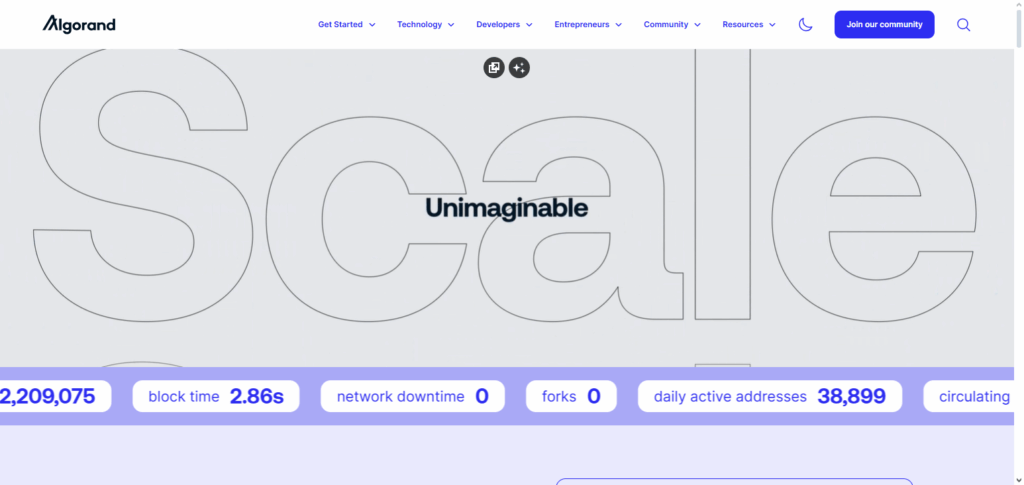
Algorand is very scalable and environmentally friendly because blocks may be verified in a matter of seconds with little computational work. Without sacrificing speed or security, its emphasis on decentralization and little energy use makes it a potent, sustainable blockchain substitute for conventional mining-based networks.
| Feature | Details |
|---|---|
| Consensus Mechanism | Pure Proof-of-Stake (PPoS) |
| Energy Efficiency | Ultra-low energy usage; carbon-neutral blockchain |
| Staking Requirement | No minimum required; all token holders can participate |
| KYC Requirement | Minimal or none when using non-custodial wallets (e.g., Pera Wallet) |
| Decentralization | Participation randomly selected from all online token holders |
| Smart Contract Support | Yes – supports Layer-1 smart contracts (ASC1) |
| Transaction Speed | ~4.5 seconds per block; scalable throughput |
| Use Case Strength | Payments, asset tokenization, enterprise, and DeFi |
7.Tezos (XTZ)
Tezos (XTZ) employs a Liquid Proof-of-Stake (LPoS) system that enables token holders to either directly validate transactions themselves or delegate their stake to “bakers,” making participation simpler without energy intensive mining.
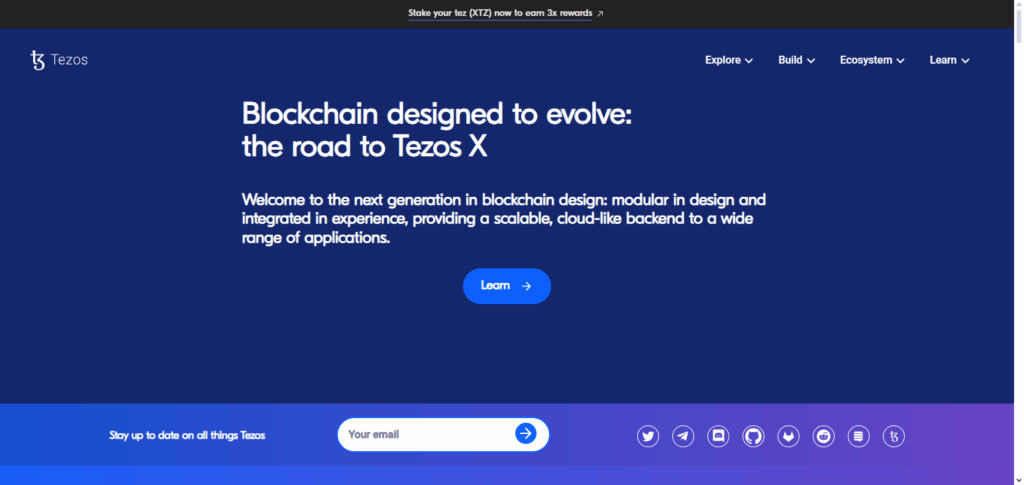
This design ensures decentralization with reduced energy usage while operating sustainably with on-chain governance allowing upgrades without forks without risk. With such sustainability, adaptability, and efficiency Tezos stands out among Proof-of-Stake blockchains as an appealing alternative mining-heavy consensus models.
| Feature | Details |
|---|---|
| Consensus Mechanism | Liquid Proof-of-Stake (LPoS) |
| Energy Efficiency | Very low energy use; no mining required |
| Staking Requirement | ~6,000 XTZ to bake; no minimum to delegate |
| KYC Requirement | Minimal or none using non-custodial wallets (e.g., Temple, Kukai) |
| Decentralization | Delegation allows wide participation without centralization |
| Smart Contract Support | Yes – supports formal verification and smart contracts via Michelson |
| Upgrade Mechanism | On-chain governance with self-amendment |
| Use Case Strength | NFTs, financial apps, and evolving protocols with low energy impact |
Conclusion
An important advancement in blockchain technology is Proof-of-Stake (PoS), which provides a safe, scalable, and environmentally friendly substitute for energy-intensive Proof-of-Work systems.
PoS significantly lessens its impact on the environment while preserving security and decentralization by substituting token-based validation for expensive mining.
Prominent systems that demonstrate the variety and power of PoS architectures include Ethereum, Cardano, Solana, Polkadot, Avalanche, Algorand, and Tezos. PoS systems enable wider involvement and open the door for long-term blockchain adoption because they require little technology and frequently don’t require KYC for staking.
FAQ
What is Proof-of-Stake (PoS)?
A consensus mechanism where validators are chosen based on staked tokens rather than solving complex computational puzzles.
How is PoS more energy-efficient than Proof-of-Work (PoW)?
PoS eliminates the need for mining hardware and high electricity use, reducing energy consumption by over 99% in some blockchains.
Which cryptocurrencies use PoS?
Ethereum, Cardano, Solana, Polkadot, Avalanche, Algorand, and Tezos are leading PoS-based blockchains.



